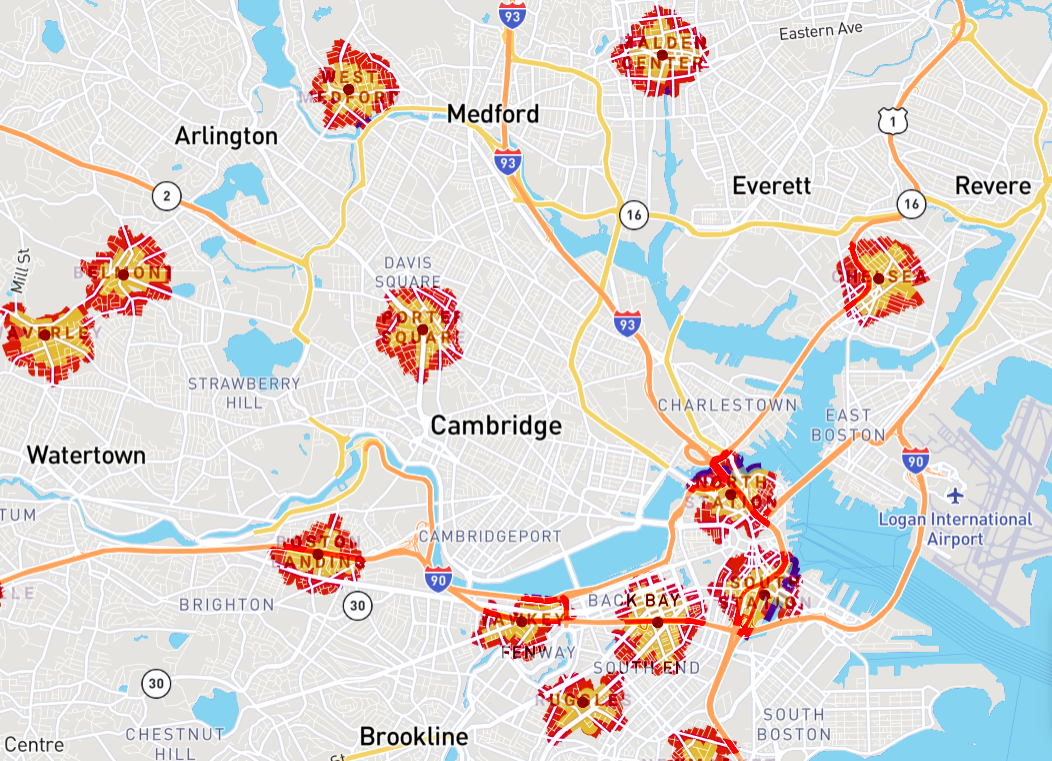mural by Cedric “Vise” Douglas and Julez Roth
Lynn, Massachusetts
The Mobility Innovator was a year-long initiative to address mobility challenges in the Boston region through the lenses of resiliency and equity.
The project, funded by the Barr Foundation and in partnership with Sasaki, sought to understand how to better connect communities of color and low-income communities to jobs, social networks, daily needs, and amenities by improving and augmenting existing and emerging transportation networks. It explored how to better leverage technology to identify gaps in current mobility options, including bike and pedestrian pattern analysis and public safety of mobility choices. The project also investigated how amenity-oriented development can achieve a higher share of retail, food, service, entertainment, and social trips on foot.
![20210204_get [t]here_SF Blog Post_2](https://www.sasakifoundation.org/wp-content/uploads/2021/02/20210204_get-there_SF-Blog-Post_2.jpg)
get [t]here
The Hideo Sasaki Foundation, in partnership with Sasaki, created get [t]here. This website explores the challenges of mobility access in Gateway Cities around Greater Boston, specifically in Lynn and Malden. Through an interactive survey circulated in fall 2020, get [t]here provided community members an opportunity to express their mobility priorities and observe how projects and policies can support their needs. The team summarized the results of these needs in an online story map that indicates which priorities, projects, and policies could be most impactful to each community. The team then overlaid existing datasets to the online map to highlight potential strategies and opportunities for improving those conditions. We hope this tool can align expressed needs with investment opportunities and muster the political will to equitably invest in mobility infrastructure in communities that have historically lacked, or been denied, quality mobility infrastructure.
Explore the research here.
The Hideo Sasaki Foundation partnered with Andres Svetsuk of the City Form Lab at MIT to research commuter rail access in Greater Boston. The research team compared measured and perceived distances to the nearest station for both pedestrians and bicycles. The research shows how these distances can substantially differ, affected by factors like traffic, grade change, and amenities. The report, Transit Access: Improving Walking and Biking to Commuter Rail Stations in Greater Boston, presents four policy options and explores how each scenario could reduce perceived distance, improving access to residents, jobs, and development opportunities in the commuter rail system as a whole.
Explore the interactive map and download the report here.

City Form Lab at MIT in partnership with the Sasaki Foundation and Barr Foundation
![20210204_get [t]here_SF Blog Post_3](https://www.sasakifoundation.org/wp-content/uploads/2021/02/20210204_get-there_SF-Blog-Post_3.jpg)
Mobility Equity Symposium and Mobility Summit
Due to the impacts of COVID-19, this portion of the Mobility Innovator was delayed into 2021.
For communities both within the urban core and without, transportation plans and investments often reinforce unequal land-use patterns and result in unequal access to economic and social opportunities. While technological advancements are increasingly offering opportunities to address those inequalities, there is a lack of planning, policy, coordination, and, significantly, communication in order to effectively seize them.
To explore these issues of mobility and equity, particularly in Massachusetts Gateway Cities, the Hideo Sasaki Foundation partnered with the MIT Mobility Initiative to host community conversations with academic researchers, community members, and city leaders.
The Mobility Equity Symposium, which took place June 5, 2021, with a focus on the cities of Lynn and Malden, offered an opportunity to hear from community members about particular transportation-related needs they have and challenges they face; to engage with local government actors to better understand opportunities and initiatives in the works; and to workshop methods and ideas to address the identified needs and challenges. The day included two panel discussions on the topics of accessibility.
The Mobility Equity Vision: Exploring Universal Basic Mobility panel took place November 16, 2021 as part of Mobility Vision Day. Panelists explored the concept of Universal Basic Mobility, offering best practices and highlighting the importance of access to quality transportation for all. Learn more and watch event recordings provided by the MIT Mobility Initiative.
Learn more about the MIT Mobility Initiative and read the initiative’s 2020 Annual Report.
